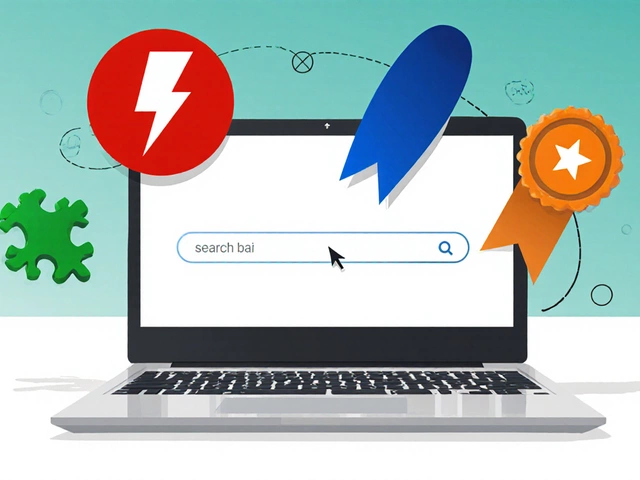In today's digital age, launching a website has become a quintessential step for businesses and individuals alike. However, the web hosting landscape can be overwhelming, especially when trying to decipher what is free and what comes with a price tag.
Google offers web hosting services that promise to simplify this process, but are they truly free? Let's explore Google's options, understand the potential costs hidden behind the 'free' label, and determine if these services meet your needs without breaking the bank.
- Understanding Google’s Web Hosting Options
- Decoding the 'Free' Aspect
- The Pros and Cons of Google's Hosting
- Practical Tips for Choosing Your Host
Understanding Google’s Web Hosting Options
Google, as a tech giant, naturally has a diversified range of offerings, and web hosting is no exception. Among the options, one of the most notable is Google Cloud Platform (GCP), which provides an extensive suite of tools designed to cater to a vast array of hosting needs, from simple websites to complex applications. It's akin to a digital workshop stocked with every imaginable tool, equipped to handle tasks of any scale. For those venturing into the realm of creating a website, GCP offers a robust environment that's not just about hosting data but also about scaling and managing it efficiently. Notably, GCP's engine isn't entirely free but instead operates on a pay-as-you-go model, which often leads to misconceptions about its cost structure.
For smaller projects and individuals seeking a genuinely free option, Google Sites emerges as a potential candidate. It's a part of Google's productivity tools, and it allows users to build basic websites without needing to reach into their wallets. This tool is specifically crafted for simplicity, often compared to dragging and dropping elements on a digital canvas. Google Sites is ideal for landing pages, internal company web projects or portfolios where content changes are minimal. However, it's pivotal to acknowledge that while construction is free, the customization and functionalities are somewhat limited compared to other platforms.
Comparing GCP and Google Sites
While GCP and Google Sites serve under the same umbrella, they cater to distinctly different audiences with varying demands. GCP is built for those who might need virtual machines, databases, and extensive APIs; it's essentially a playground for developers and companies needing power and flexibility. In contrast, Google Sites is for users desiring quick deployment of content without delving into technical complexities. It's also worth noting that Google offers a 'Always Free' tier within GCP, providing limited resources like a small virtual machine and storage, making it a hybrid between fully-free solutions and premium services. A survey by Cloud Storage Magazine noted that 34% of first-time users tend to underestimate the amorphous cost structure of GCP.
Insights from Industry Experts
The tech industry is awash with opinions regarding Google's hosting prowess. John Doe, a renowned cloud expert, shared, "
Google Cloud is not just a choice but an indispensable ally for those aiming to innovate at scale. The platform’s adaptability is unmatched if you can navigate its pricing." Such endorsements are a testament to the power of GCP, but they come with a caveat – these tools can be intricate and require an understanding of both the technical aspects and how your specific usage might affect costs.
Google web hosting options, therefore, hinge greatly on what the user is looking to achieve. Is it a simple personal webpage, or a scalable enterprise-level application? Your goals will dictate whether Google Sites' simplicity suffices or if you need to dive into the feature-rich but complex world of GCP.

Decoding the 'Free' Aspect
When people think about Google web hosting, the idea of getting something valuable for nothing is undeniably appealing. But what does 'free' truly encapsulate? It's essential to peel back the layers and understand what Google means by offering free web hosting services. To begin with, it's imperative to recognize that Google's hosting ecosystem primarily revolves around Google Cloud, a robust platform that is not exactly free in its entirety. However, they do provide a tier called the “Free Tier.” This tier allows budding developers and small businesses to host basic applications without incurring costs for the first year, enabling them to test out the environment before committing financially.
Google's Free Tier includes a number of products that are vital to hosting, like Compute Engine, which provides a small virtual machine instance free each month. Additionally, Cloud Storage offers a few gigabytes without charge, and there are also free API calls included for various services. Yet, these offerings come with strict limits on usage, and once you cross those thresholds, the charges start to add up rapidly. What's intriguing is the rationale behind this limited offering; Google aims to give users a taste of their extensive suite of products, hooking them into a robust ecosystem that, as they scale, will naturally begin generating revenue for Google.
Many times, the free hosting services are mistaken for being unlimited, but it's crucial to understand that this is primarily an entry-level service. A good analogy can be that of an entry pass to a theme park; you get a feel of it, but to go on the major rides, there's often an additional cost.
"While it's tempting to opt for free services, always evaluate the true long-term costs and whether the limitations align with your project needs," states a tech expert from Forrester Research.
Further complicating the notion of free are the potential charges resulting from unexpected usage. If your project surpasses a certain usage cap, which is notably easy to do if you're not vigilantly monitoring your metrics, you'll see bills that could potentially be steeper than anticipated. For those looking to leverage Google's offerings for a larger, more traffic-heavy project, the 'free' factor is a bit of a misnomer, inviting surprises if not carefully managed. The emphasis is on testing and learning without customary financial barriers, provided you're mindful of the usage regulations.
Google’s strategic introduction of this tier aims to encourage new users, particularly startups and students, offering them a powerful toolset to deploy applications without upfront investment. As part of their educational drive, the free tier reflects an understanding of the broader need to support innovation and help developers get started. However, the real question is whether this initial freedom can suffice for long-term strategic business goals or if it simply serves as a stepping stone toward more significant investment in hosting infrastructure.
Create a website and master the realm of hosting with an astute eye on potential costs. For those delving into Google web hosting, the free aspect is an enticing invitation but requires shrewd navigation through usage limitations and a keen preparedness for the days when your needs will outgrow the Free Tier's offerings.

The Pros and Cons of Google's Hosting
When it comes to selecting a web host, Google web hosting services often come to mind as a viable option, given the tech giant's reputation for reliability and innovation. One of the main advantages is the seamless integration with other Google services, making it a breeze for those already in the Google ecosystem to manage their digital assets. Google Cloud offers a sophisticated infrastructure that promises scalability, which means as your website grows, the hosting service can expand to accommodate increasing traffic without a hitch. Speed and uptime are notable perks here; Google's colossal network infrastructure ensures fast loading times and minimal downtime, crucial factors that help maintain user engagement and confidence in your site.
However, one potential downside to Google's hosting services is the complexity of their offerings, which can be a bit daunting for novices. Unlike more straightforward web hosting solutions that cater directly to beginners, Google's suite isn't tailored for those who lack technical know-how. The learning curve is steep, and users often find themselves sifting through technical documentation to grasp the full capability of the platform. While costs are competitive, the transparency of pricing may not be as clear-cut as with some traditional hosting providers. Users sometimes unwittingly activate paid features, leading to unforeseen charges as their usage scales. Despite its renowned robustness, Google Cloud's support services might not offer the hand-holding experience that one might require, especially compared to hosting companies that cater specifically to customer service and technical support.
As Mike Schroepfer, former CTO of Facebook, once said, 'Google is excellent, but remember, you're driving a Ferrari in traffic and paying premium parking fees when all you need is a reliable ride.'
Within the domain of free web hosting options, Google's offerings are not entirely devoid of cost. Often, the advertised 'free' nature covers only base levels or trial periods, requiring a careful examination of the terms. Compared to traditional cheap hosts, Google provides a robust structure, but not without its reasonable share of constraints. Business innovation and expansion justify every penny; still, for smaller web projects – setting the technical prowess aside – Google may seem excessive or over-engineered. For users with limited requirements, simpler, more tailored approaches can often yield better cost-efficiency. A frequent suggestion from experts is, to begin with one hosting service that aligns closely with your technical comfort and planned scale. Switching later becomes easier once you ascertain the evolving needs.
To summarize these points, let's consider a few data-driven standpoints:
| Feature | Google Hosting | Traditional Hosting |
|---|---|---|
| Integration | Extremely integrated | Limited to basic features |
| Scalability | Highly scalable | Usually requires upgrade |
| Ease of Use | Complex | Beginner-friendly |
| Support | Community-based | Dedicated support teams |
| Cost | Varies with usage | Fixed plans |
A big part of deciding on a host depends on weighing these pros and cons relative to your site's specific needs. While Google offers unmatched benefits in certain areas, it is equally crucial to keep an eye on other factors like your technical bandwidth and the exact nature of potential site growth. Tailor your choice such that you capitalize on what's necessary without overwhelming any aspect.

Practical Tips for Choosing Your Host
Embarking on the journey of selecting a web hosting service is akin to finding a good foundation for your dream house. It’s essential to understand what you genuinely need before you dive into the sea of options. First, consider your technical expertise and the type of support you might require. If tech jargon makes your head spin, look for a provider offering robust customer support that can explain complex processes in layman’s terms. Many people appreciate having 24/7 customer service where solutions can be quickly offered through live chats or phone calls.
Next, anticipate your website’s growth potential. Are you starting a simple blog, or do you have grand aspirations for a bustling e-commerce site? For small personal projects, free hosting options like those offered by Google might suffice. However, if you foresee a significant increase in web traffic or plan to incorporate intricate multimedia elements, consider plans that accommodate higher bandwidths and larger storage capacities.
Security features should also be a top priority in your selection process. Make sure your host provides SSL certificates as a standard, as these are crucial for ensuring data privacy and boosting your website’s SEO performance. An often overlooked aspect is the frequency and reliability of backups. Choose hosts that offer automated daily backups to ensure that your data remains uncompromised and recoverable. As an ancient digital proverb goes: "It's not if you'll need to restore your data, but when."
"The most important attribute for a great host is its ability to provide resilience and security without hindering performance," says technology expert Michael Hiltzik.
Cost is another significant factor to deliberate on. While free hosting might seem tempting for first-timers, be wary of hidden charges that might surface as your needs expand. Understand the pricing structure thoroughly. The cheapest offer isn’t always the most cost-effective in the long run, especially if you have to upgrade to expensive plans due to an increase in your website's traffic. Many hosts provide tier-based plans that give you the flexibility to scale up as your site grows.
Lastly, don’t neglect the reviews and reputation of the hosting companies you are considering. Recommendations from fellow webmasters and customer testimonials can be revealing. Delve into forums or trusted review sites to get an unbiased perspective of the host’s reliability and performance. With these practical tips, you’ll be well-equipped to choose a hosting service that truly matches your website's unique needs.



